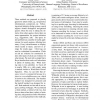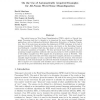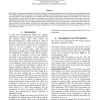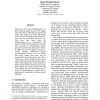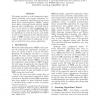103 search results - page 9 / 21 » A Maximum Entropy-based Word Sense Disambiguation System |
EMNLP
2009
13 years 7 months ago
2009
Three methods are proposed to classify queries by intent (CQI), e.g., navigational, informational, commercial, etc. Following mixed-initiative dialog systems, search engines shoul...
JAIR
2008
13 years 9 months ago
2008
This article focuses on Word Sense Disambiguation (WSD), which is a Natural Language Processing task that is thought to be important for many Language Technology applications, suc...
LREC
2010
13 years 11 months ago
2010
In this article, we present an experiment of linguistic parameter tuning in the representation of the semantic space of polysemous words. We evaluate quantitatively the influence ...
ACL
2008
13 years 11 months ago
2008
Supervised word sense disambiguation requires training corpora that have been tagged with word senses, which begs the question of which word senses to tag with. The default choice...
CORR
2000
Springer
13 years 9 months ago
2000
Springer
This paper describes a set of comparative experiments, including cross{corpus evaluation, between ve alternative algorithms for supervised Word Sense Disambiguation (WSD), namely ...
